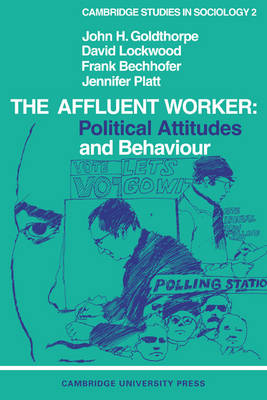Cambridge Studies in Sociology
3 total works
The Affluent Worker in the Class Structure
by John H. Goldthorpe, David Lockwood, Frank Bechhofer, and Jennifer Platt
Published 1 December 1969
This final book in The Affluent Worker series was originally published in 1969. It contains the findings and conclusions on the issues the research was specifically designed to investigate - the extent of working class embourgeoisment. This thesis is examined in the several contexts of work, sociability, social aspirations and imagery, and so on. At all these points it is called into question empirically and conceptually. In this volume which brings the project to an end, the authors also take up again the broad questions of class and politics out of which the investigation originally sprang.
The Affluent Worker
by John H. Goldthorpe, David Lockwood, Frank Bechhofer, and Jennifer Platt
Published 1 December 1968
This 1968 volume, the second of The Affluent Worker monographs, reports on the voting and political attitudes of highly paid manual workers. As in the first book, the affluent workers studied are employed in Luton, a town which benefited faster and more consistently than almost any other in Britain from the economic progress of the 'fifties and early 'sixties. The sample was chosen as a 'critical' case to test some widely accepted views on the assimilation of the working classes into patterns of middle-class social life. On the basis of material from interviews, the authors give an account of the workers' political orientations, and this is followed by an analysis of voting in relationship to income house ownership, social origin and trade union membership. The main findings - that, despite their affluence, the majority of these workers remain staunch supporters of the Labour Party - runs counter to contemporary beliefs about working-class embourgeoisement.
The Affluent Worker: Industrial Attitudes and Behaviour
by John H. Goldthorpe, David Lockwood, Frank Bechhofer, and Jennifer Platt
Published 1 July 1968
The affluent workers studied in this book, originally published in 1968, were employees of three major industrial concerns sited in Luton at the time. The three firms were selected as being amongst Luton's best-paying employers and also on account of their advanced personnel and labour relations policies. This choice enabled comparisons to be made between workers engaged in very different types of production system. On the basis of material from interviews and other data, the authors examine in detail workers' experience of their industrial jobs, their relations with workmates, and the nature of their attachment both to the organizations which employ them and to their trade unions. This study forms part of a larger project which was aimed at testing empirically the thesis, which was most prevalent 1968, that of the progressive assimilation of manual workers and their families into the pattern of middle class social life.

